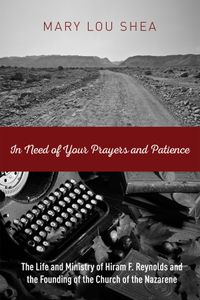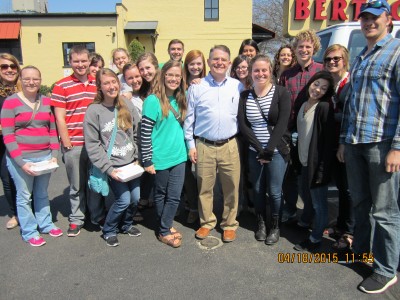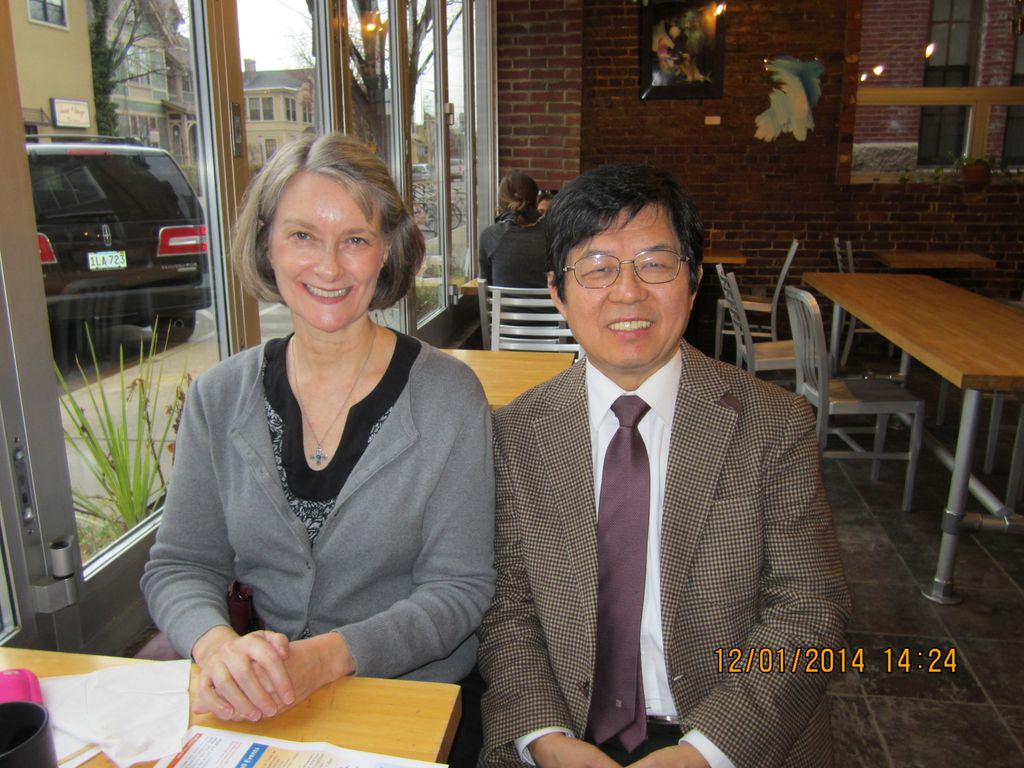Alumni
Religious Freedom and Rising Intolerance in Pakistan
Attacks on Christians and other minorities has been on the rise in Pakistan. The country has also seen an increase in persecution and discrimination based on blasphemy laws. Why is religious intolerance on the rise, and what does this mean for religious freedom in one of the world's most populous nations?
School of Theology alumnus Titus Presler was invited by The Daily Beast, the popular online news site, to write about threats to religious freedom in Pakistan in relation to the church-state struggle over Edwardes College and the attack he experienced last year in Peshawar. The article is "Why has Pakistan become so intolerant?" which you can read in full here.
Visiting Researcher Writes about H. F. Reynolds and the Foundation of the Church of the Nazarene
 For three years, Mary Lou Shea was a Visiting Researcher at the Center for Global Christianity & Mission. During that time, she devoted herself to uncovering the story of Hiram F. Reynolds, one of the first two General Superintendents in the Church of the Nazarene, and the architect of Nazarene missions around the world. The result of her work has recently been published as In Need of Your Prayers and Patience: The Life and Ministry of Hiram F. Reynolds and the Founding of the Church of the Nazarene.
For three years, Mary Lou Shea was a Visiting Researcher at the Center for Global Christianity & Mission. During that time, she devoted herself to uncovering the story of Hiram F. Reynolds, one of the first two General Superintendents in the Church of the Nazarene, and the architect of Nazarene missions around the world. The result of her work has recently been published as In Need of Your Prayers and Patience: The Life and Ministry of Hiram F. Reynolds and the Founding of the Church of the Nazarene.
Recently, Daryl Ireland asked Dr. Shea about the project. This is how she responded:
I did not choose Reynolds; he chose me, with the help of denominational archivist, Dr. Stan Ingersol, who approached me at a conference to ask if I would undertake the monumental task of reading the Reynolds archive and to consider writing his story. Since I knew nothing about Reynolds, and my colleagues (all ordained elders in the Church of the Nazarene) knew shockingly little about him, I said, "Sure." This is not unusual for me. In the first grade, each student had to choose a bird to report upon to the class. Did I choose the robin? The blue jay? The goldfinch or oriole? No, I picked the phoebe bird. In the fifth grade, we each had to write a report on a hero of the Revolutionary War, so I picked Molly Pitcher. Who wouldn't? When Reynolds presented himself, I was compelled to take on the challenge. Why write about someone we already know when there is something new to be learned?!
I worked with lots of primary materials. Reynolds was kind enough to save what must have been every piece of correspondence he ever received! (Well, maybe not every one, since the archival material grew exponentially once the Pentecostal Church of the Nazarene was created.) He also kept carbon copies of most of his outgoing correspondence. So, I had an abundance of letters, cables and wires, sermon outlines, schedules, to-do lists, receipts, article manuscripts and photographs to fill in the details. I also had access to personal letters to and from his wife and children. He also left an unpublished memoir written when he was 75 and reflecting, from his perspective, on the life he had led. This was especially crucial in filling in the details of his youth and his years as a Methodist Episcopal minister in Vermont. Together, I was given an unusually well-rounded portrait, written in his own hand. In addition, I had access to holiness newspapers and, from their first issues, of denominational newspapers that followed his travels, printed his columns and editorials, and reported on his work as a General Superintendent and missionary leader. Then there were the minutes of meetings, some handwritten, from a variety of sources including Annual Conferences, General Assemblies, meetings of the Women's Missionary Society, gatherings of denominational mission leadership (like the General Board of Foreign Missions) and other such groups. For me, the difficulty was not in gathering enough material to piece together a biography. It was sifting through mountains of material, knowing that every choice I made to include one thing meant choosing to exclude others. I tried very conscientiously to chose representative materials that could offer glimpses into much larger volumes of related materials across the breadth of his responsibilities. The incidents, people, concerns, policies and practices that receive the most attention are the ones that Reynolds, himself, spent the most ink and time trying to resolve, create, or manage. Since they dominated weeks, months, or years of his documented time and effort, they became important aspects of this book.
Some folks have gently wondered if I have soft-soaped his story because, when I talk about him, he sounds too good to be true. That always makes me sad. Reynolds was human and he was bold in revealing his own faults and sinfulness to any who would listen to his testimony of God's grace and the joys of living a holy (sanctified) life. Still, during a tumultuous life filled with adventure, illness, and disaster, he strove, day in and day out, to live up to his calling as a minister of the Gospel of Jesus Christ. So far as I could ascertain, once he set off to follow Jesus he never committed adultery, lined his own pockets with church money, cheated anyone he met, or indulged in drinking alcohol, smoking, or gambling. Unhappily, with our societal taste for scandal, we find it hard to believe that an honest biography could present a man of integrity. What a shame that scandals have become so associated with Christianity that a biography is suspect if there are no lurid skeletons being dragged out of the closet. Perhaps this book can offer an alternative to the standard hypocrisy narrative, for I believe it accurately captures a person who embraced the joys of holiness, setting an example we might all do well to follow.
Alumnus Chris James gives media interviews on church innovations in Seattle
The Pacific-Northwest has some of the highest rates in the country of religious "nones," people who claim no particular religious affiliation. Yet cities like Seattle are also home to a number of innovative Christian churches. In two media interviews, alumnus Christopher James of Dubuque University discusses his research on new church formations in Seattle and what they may tell us about the future of religion. You can access them from KING5 News "Religious Affiliation and the Future Church," and KUOW.org "The Future Of Religion? A Researcher Looks To Seattle For Clues."
You can follow Christopher James and his research on Twitter (@chrisbjames) and www.jesusdust.com
The Making of Korean Christianity
 The award winning book, The Making of Korean Christianity: Protestant Encounters with Korean Religions, 1879-1915 was recently reviewed in the Africanas Journal. The publication is doubly significant for the Center for Global Christianity & Mission, as the author of the book, Sung-Deuk Oak, graduated from the Boston University School of Theology in 2002. The review was written by Gun Cheol Kim, a current PhD candidate in Mission Studies at the School of Theology.
The award winning book, The Making of Korean Christianity: Protestant Encounters with Korean Religions, 1879-1915 was recently reviewed in the Africanas Journal. The publication is doubly significant for the Center for Global Christianity & Mission, as the author of the book, Sung-Deuk Oak, graduated from the Boston University School of Theology in 2002. The review was written by Gun Cheol Kim, a current PhD candidate in Mission Studies at the School of Theology.
Alumnus Shawn Daggett Visits Massachusetts with Mission Students

(Above: Shawn Daggett and Students)
Dr. Shawn Daggett, professor of mission at Harding College, has been in Massachusetts on a mission trip with 26 students, looking at historical mission sites. Harding College has a robust missions program, with over 300 undergraduate minors.
Daggett earned his Bachelors and Masters at Harding before entering the Th.D. program at Boston University. His degree is in New Testament and Missions.
Shawn and his wife Donna worked as missionaries in Italy from 1986 to 1996, and he worked at a church in Natick, MA. Daggett hopes to equip students to work as missionaries in Europe and New England.
(Above: Donna and Shawn Daggett with Dana Robert)
Church Networks Respond to Earthquake in Nepal
Numerous churches have mobilized to respond to the devastation in Nepal. One, in the Boston area, is pastored by an alum of the Boston University School of Theology. In the Boston Globe, the Rev. Dan Pokharel has explained how the local Nepalese community is responding to the crisis.
Together Towards Life: An Ongoing Conversation
This October 20-23, I had the opportunity to travel to Pietermaritzburg, South Africa, to participate in a consultation organized by the Commission on World Mission and Evangelism (CWME) of the World Council of Churches (WCC). The consultation explored developing curricula for missionaries, pastors, and laity designed around Together towards Life: Mission and Evangelism in Changing Landscapes, the WCC’s new affirmation on mission and evangelism.
The content of Together towards Life has been summarized and critiqued elsewhere, so I will not do so here. Readers interested in seeing the document themselves may visit http://www.oikoumene.org/en/resources/documents/commissions/mission-and-evangelism/together-towards-life-mission-and-evangelism-in-changing-landscapes
Participants in the consultation came from all around the world, including the Americas (US, Argentina, Jamaica); Europe (UK, Switzerland, Norway, Italy, Romania, Hungary, Italy); Asia and Oceania (Sri Lanka, Australia, New Zealand, Fiji, Korea); and, of course, Africa (South Africa, Rwanda). One of the richest parts of the event for me was meeting these scholars and practitioners and learning from them.
The consultation was an intensive period of study, reflection, and discussion. We spent Monday, Wednesday, and Thursday in discussion, both plenary and small groups. We spent Tuesday visiting sites near Durban associated with mission: an AIDS resource center started by a congregation of the Methodist Church in South Africa, a charismatic healing preacher, and the school started by John Dube, an indigenous South African leader and missionary protégée.
The discussions about the document were rich. Several items rose to the top as considerations in preparing Together towards Life curricula. The importance of contextualizing the document was tantamount. Questions of access, distribution, and translation were raised. The group also noted the distinction between a WCC-driven process of curriculum development and a grassroots process.
In the end, it seems like both processes will proceed. The WCC will continue to assemble working groups to develop curricula, but other groups will also do their own work on the document. Among those efforts is one that I facilitate. UM & Global (umglobal.org), a blog sponsored by the United Methodist Professors of Mission, is currently in the midst of a discussion of the potentials and pitfalls for using this document in teaching.
David W. Scott, '13
Distinguished historian of Korean Christianity visits BU
Many alumni associates of the CGCM have gone on to make important contributions to the history of Christianity as it has developed in various parts of the globe. Alumnus Myung Soo Park of Seoul Theological University, has gone on to be a distinguished senior historian of Korean Christianity. He returned to his alma mater this past week, sharing his work and research while visiting CGCM Director Dana Robert.

Alumni connect in Korea through Ministry and Teaching
There was a BU alumni meeting at Yonsei University in Seoul, South Korea. Dr. Seong Jung Joo (Th.D in Liturgics and Mission from BUSTH), Dr. Soo-Young Kwon (M.Div from BUSTH, Ph.D in Religion and Pychology from GTU, Berkeley) and Dr. Charles Farhadian (Ph.D in Anthropology and Mission from BU Religious Studies) gathered after Dr. Joo preached at Yonsei chapel last week. Joo is the senior pastor of Juan Presbyterian Church, which is one of the largest congregations (so-called Mega-churches) in South Korea, having 30,000 member and 70 associate pastors. Dr. Kwon is professor of pastoral theology at United Graduate School of Theology, Yonsei University and director of Yonsei University Center for Counseling and Coaching Services. Dr. Farhadian is professor of world religions and Christian mission of Westmont College and teaching at Yonsei University for this semester, while taking his sabbatical year. They had a wonderful time together, sharing their lives and work.
By Duse Lee

Mission and the Challenge of Engaging Difference
 What are the three greatest challenges facing us in the next decade? This important question was the topic of the School of Theology's 2014 Distinguished Alumni panel. The panel, “The Three Greatest Challenges Facing Us in the Next Decade,” was composed of the recipients of this year's Distinguished Alumni Awards. among this years winners was Rev. Canon Titus Presler (Th.D), mission activist with experience in Africa and Asia, and current Principal of Edwardes College in Pakistan, chose to respond to the question by thinking about how differences across and within communities are all too often associated with danger. Read Rev. Presler's compelling presentation online at Engaging Difference: A Major Challenge of Our Time.
What are the three greatest challenges facing us in the next decade? This important question was the topic of the School of Theology's 2014 Distinguished Alumni panel. The panel, “The Three Greatest Challenges Facing Us in the Next Decade,” was composed of the recipients of this year's Distinguished Alumni Awards. among this years winners was Rev. Canon Titus Presler (Th.D), mission activist with experience in Africa and Asia, and current Principal of Edwardes College in Pakistan, chose to respond to the question by thinking about how differences across and within communities are all too often associated with danger. Read Rev. Presler's compelling presentation online at Engaging Difference: A Major Challenge of Our Time.
